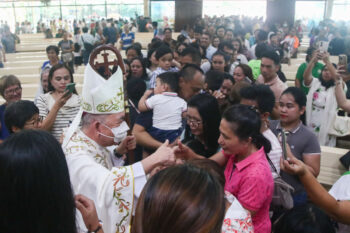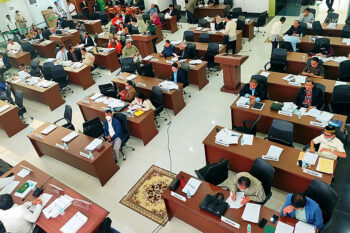MELBOURNE, Australia (MindaNews / 3 Feb) – The Corruption Perceptions Index (CPI) annually issued by Transparency International has been a widely used tool in assessing the extent of public sector corruption of nation-states. For the CPI of 2015, the Philippines ranked 95th out of 168 nations.
This is not exactly a good result given that the current administration’s flagship program is the highly touted, Daang Matuwid. Indeed, this can even be seen as the proverbial egg in the faces of the various Malacañang representatives who never failed to remind the public of the so-called “big fish” perpetuators they have caught.
This disappointing ranking however seems spot on specially when state auditors have recently found that more than a billion worth of government disbursements are dubious and questionable.
Not surprisingly, all of the five presidential candidates have declared curbing corruption in government as their topmost priority if elected.
Secretary Mar Roxas has promised to improve the current administration’s anti-corruption strategy. Whilst Senators Miriam Defensor-Santiago and Grace Poe are each proposing their own version of Daang Matuwid.
As a self-styled tough-talking local executive, Mayor Rudy Duterte promises to eradicate corrupt government officials from the face of the earth within 6 months from assuming office. To be fair, his wrath covers all forms of criminality.
However, the anti-corruption discourse in this year’s presidential election takes a turn to the absurd and unbelievable with the promise of Vice President Jojo Binay to do a much better job at prosecuting graft and corruption in government.
The CPI actually evinces that corruption is not unique to the Philippines. More importantly though, nations that rank high in this index can serve as the standard to emulate with regard to establishing an effective anti-corruption measure.
For many years now Singapore has consistently been perceived as the least corrupt country in Southeast Asia. Thus, making its anti-corruption framework the most logical benchmark for the Philippines to follow.
In fact, Singapore’s anti-corruption strategy has been widely studied precisely because of its apparent effectiveness. I am citing two articles here to highlight two lessons that stand out.
The first one is Corruption in Asia: Pervasiveness and Arbitrariness. This article shows maintaining one strong and independent anti-corruption agency is the most effective way of curbing corruption in the public sector.
The Corrupt Practices Investigation Bureau is the only body which investigates corruption in Singapore. But its most critical quality is its institutional insulation from politics.
The equivalent entity for the Philippines is the Office of the Ombudsman. Notably however, every president elected since 1992 have all created their own anti-corruption office. Therefore, instead of just having one agency to tackle this problem, we have multiple agencies.
Many anti-corruption experts believe this is precisely the reason why the Philippines has failed in the battle against graft and corruption. As we have seen many times in the past, the “turf war” syndrome has afflicted the various anti-corruption offices. And if not engaged in the blame game, officials of these agencies rarely coordinate with each other.
The ultimate effect of having multiple offices undertaking anti-corruption functions is the dilution of resources. Spreading funds across different agencies performing the same mandate is obviously counter-productive.
The second article is Combating Corruption in the Asia-Pacific Countries: What Do We Know and What Needs to be Done?. The lesson to highlight here is that political will is the most important prerequisite for an anti-corruption strategy to be successful.
Meaning, if the leaders of the incumbent government are dead serious in defeating graft and corruption, they must allocate the required resources to the anti-corruption strategy and ensure the impartial enforcement of the anti-corruption laws by the anti-corruption agency.
Bearing in mind these two key features of an effective anti-corruption framework, the proposals offered by the five presidential candidates now seem anachronistic and even disingenuous.
Therefore, the most viable and sound approach for a presidential aspirant who is genuinely serious about getting rid of corruption in government is to simply allow the Ombudsman to perform its function unhindered. Now this is not exactly a hard proposition considering the current Ombudsman is widely seen as one who is “on the job”.
Indeed, the more believable demonstration of political will to fight corruption by a presidential candidate is the assurance to voters that the following commitments shall be made in the first State of the Nation Address.
First, that all other anti-corruption offices within the executive branch will be immediately abolished. That henceforth, there is only one agency tasked with investigating and prosecuting corruption in government and that is the Ombudsman.
Second, that the fiscal autonomy of the Ombudsman will never be compromised. That the executive will never short-change the budgetary allocation for this office. Additionally, that Malacañang will provide full support to the Ombudsman whenever haring or loaning government resources is necessary.
Third, that Malacañang will not obstruct in any way the work of the Ombudsman. Corollary thereto, that the Office of the President will not protect political allies and family members from the Ombudsman. The latter will have free reign in investigating and prosecuting corrupt behaviour in government.
Fourth, that the community, academe, media, civil society organizations, and business groups should all rally behind the Ombudsman. That all Filipinos are enjoined to help the office and actively participate in the war against the corrupt officials in government.
Following the Singapore model seems simple enough. Adopting it is a classic low-risk, high-yield proposition for Filipinos. Clearly, an alternative which all Presidentiables should seriously consider.
[MindaViews is the opinion section of MindaNews. Atty. Michael Henry Ll. Yusingco is a practicing lawyer. He is presently completing a Masters of Law and Development in Melbourne Law School. He recently published a book entitled, Rethinking the Bangsamoro Perspective.]







